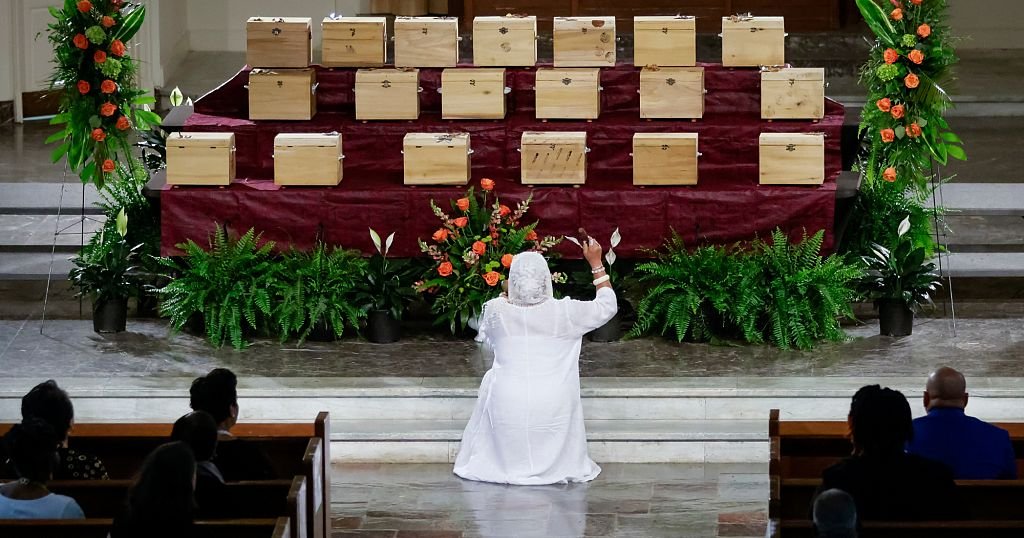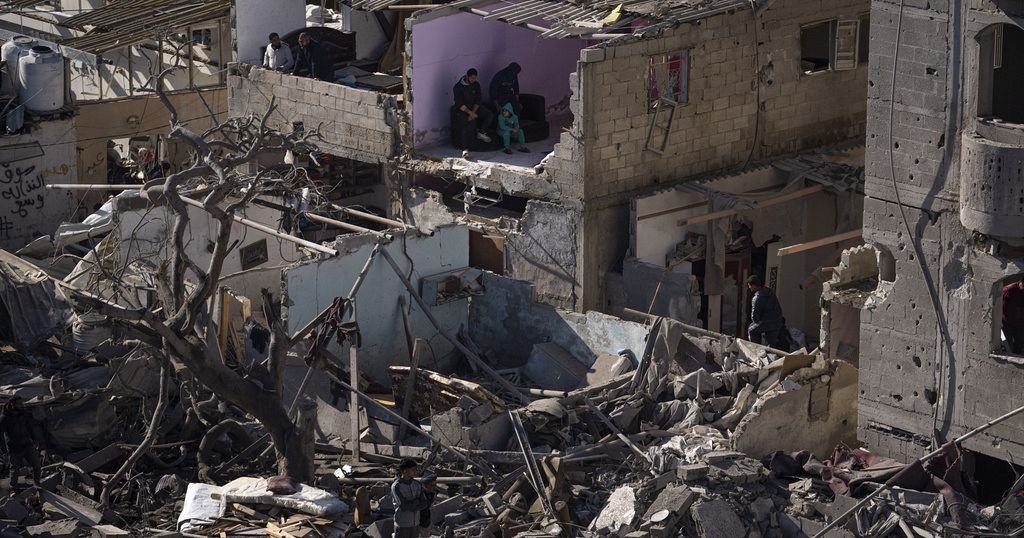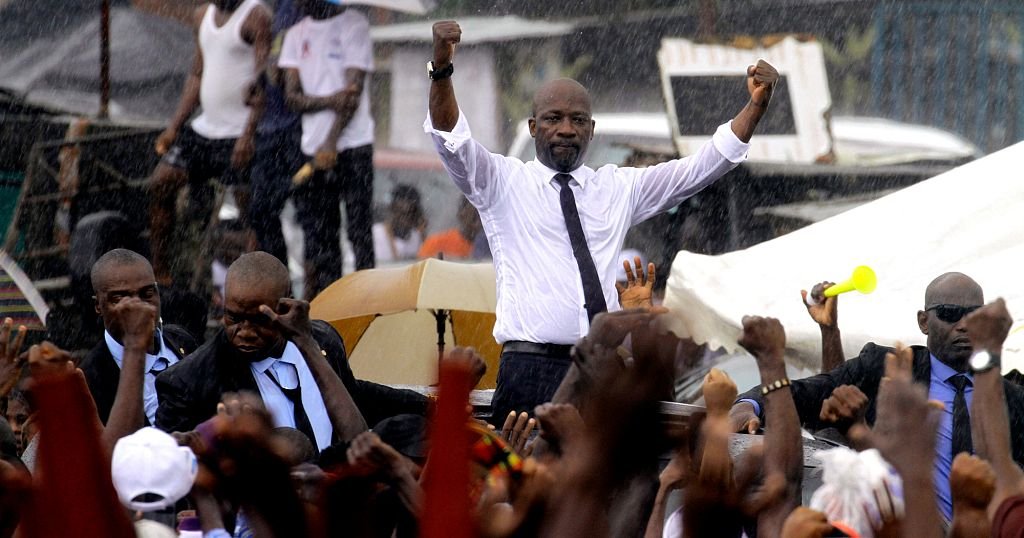Africa
Power Play or Partnership? America’s Strategy in Africa [Business Africa]

This Week: U.S. Influence in Africa, EU-Zimbabwe Trade, and Uganda’s Tea Crisis
This week, our guest, historian Amzat Boukari-Yabara, revisits the intensifying American influence in Africa, spanning energy and mining projects. Meanwhile, the European Union seeks to strengthen its trade ties with Zimbabwe, and in Uganda, the tea industry is reeling from a pricing crisis.
Africa and the U.S.’s Multidimensional Strategy
As major powers vie for access to Africa’s strategic resources, the United States is deploying a complex strategy that blends economic investments, security cooperation, and diplomatic mediation. This approach aims not only to secure energy and mineral supplies but also to counter the growing influence of China and Russia on the continent.
Nigeria-Morocco Pipeline: An Energy and Geopolitical Keystone
The Nigeria-Morocco gas pipeline project (5,660 km, $25 billion) perfectly illustrates this strategy. Actively supported by Washington, this mega-project serves several strategic goals: reducing Europe’s dependence on Russian gas, countering Chinese advances—with the Jingye Group already supplying construction materials—and bolstering American influence. “There has been a reshaping of energy stakes since the war in Ukraine,” explains historian Amzat Boukari-Yabara, noting how the U.S. is exploiting Europe’s new vulnerabilities.
DR Congo: Mining Wealth and Instrumentalized Instability
In the Democratic Republic of Congo, U.S. strategy reveals its contradictions. On one hand, companies like KoBold Metals (backed by Bill Gates and Jeff Bezos) are making major investments in cobalt and copper extraction. On the other, Washington offers conditional military support in the east of the country while positioning itself as a mediator in the conflict with Rwanda. “We are witnessing the monetization of instability,” Boukari-Yabara warns, highlighting “a U.S. ability to exert diplomatic, commercial, and security blackmail.” This approach peaks with opaque negotiations involving Rwanda over Congolese resources, which “tend to perpetuate the crisis in eastern Congo.”
Kenya and Rare Earths: A Strategic Partnership
In Kenya, the U.S. is strengthening partnerships around rare earths, which are essential for the energy transition. This push is part of a global race for critical minerals, where Washington seeks to close the gap with Beijing. It also comes alongside a military repositioning in the region, particularly in the Sahel after France’s withdrawal.
Questionable Tactics
Recent American initiatives raise concerns about respect for African sovereignty. The most striking example is Trump’s proposal to recognize Somaliland in exchange for accepting Palestinian refugees. For Boukari-Yabara, these “deal-making negotiations” reflect a purely transactional view of relations with Africa.
In the face of this aggressive policy, the historian calls for an urgent, unified continental response: “We need to create transnational industries and resolve the CFA franc issue.” His call for unity resonates, as “all these resources directly concern the U.S. in its global vision.” The key question remains whether African countries can turn this new geopolitical rivalry into a genuine opportunity for sovereign development.
Zimbabwe: Toward Strengthened Trade Ties with the EU?
As the United States reduces its aid to many African countries, the European Union is revising its strategy on the continent—particularly in Zimbabwe. Brussels is moving from the role of donor to co-investor, offering duty- and tax-free access to its market. France is supporting local agricultural SMEs, and the Netherlands already imports Zimbabwean fruits and steel.
This renewed European trade push comes amid a tense political climate. The recent NGO law (PVO Bill), deemed repressive by civil organizations, has sparked concern. Nevertheless, the EU hopes Zimbabwean businesses will seize the opportunity.
A report by Keith Baptist.
Uganda: Tea Industry in Peril Amid Price Collapse
Uganda’s tea industry is undergoing an unprecedented crisis. Tea prices have dropped significantly, averaging just $0.79 per kilo—far below the more than $2 fetched by Kenyan and Rwandan teas. This sharp price drop has led many farmers to abandon tea in favor of more profitable crops such as maize and bananas.
Victoria Ashabahebwa, director of Swazi Tea Co. LTD, notes that more than a million Ugandans depend on tea for their livelihood. Declining tea quality, high production costs, and a lack of government support are all contributing factors. Farmers and processors have called on the government to invest in the sector and rescue an industry that was once thriving—but so far, no official response has been given.
A report by Isabel Nakirya.
Africa
Skulls of 19 African Americans returned to New Orleans after 140 years

After their bodies were dismembered over a century ago and their skulls sent to Germany in racially-biased phrenology research, the remains of 19 African Americans have been returned to New Orleans for a proper send off. Sometime in the 1880’s New Orleans physician Dr. Henry D. Schmidt sent 19 crania to Leipzig, Germany for research.
The research believed skull shape could determine personality traits. In 2023, researchers with University of Leipzig began organizing the return of 19 skulls. “It is a demonstration of our own morality here in New Orleans and in Leipzig with the professors there who wanted to do something to restore the dignity of these people,” historian Eva Baham said.
Baham, who led a team of researchers, believe these 19 people died of natural causes. A jazz funeral in New Orleans was planned in their honour.
Africa
Gaza residents plead for ceasefire amid humanitarian crisis

Hamas is seeking amendments to the latest U.S. ceasefire proposal for Gaza, a senior official with the group told The Associated Press on Saturday, as Palestinians in the Gaza Strip expressed hope the war would stop soon.
The Hamas official, speaking on condition of anonymity due to the sensitivity of the talks, said proposed amendments focused on “the U.S. guarantees, the timing of hostage release, the delivery of aid and the withdrawal of Israeli forces.” A separate Hamas statement said the proposal aimed for a permanent ceasefire, a comprehensive Israeli withdrawal from Gaza and an ensured flow of aid. It added that 10 living hostages and the bodies of 18 others would be released ” in exchange for an agreed-upon number of Palestinian prisoners.”
Israeli officials have approved the U.S. proposal for a temporary ceasefire in the nearly 20-month war and U.S. President Donald Trump has said negotiators are nearing a deal. Reacting to the latest developments, one man in Deir al-Balah in the central Gaza Strip said Palestinians hoped ‘to God that we will be rid of this war,” adding that they were “tired” of the relentless bloodshed.
As dusk settled over the city, another man said he hoped a deal would be agreed soon so that aid could be distributed. A ceasefire would pause the fighting for 60 days, release some of the 58 hostages still held in Gaza in exchange for Palestinian prisoners and much-needed food aid and other assistance, according to Hamas and Egyptian officials who spoke earlier on condition of anonymity because they were not authorised to talk to the media.
The nearly three-month blockade on Gaza has pushed the population of over 2 million to the brink of famine. While pressure slightly eased in recent days as Israel allowed some aid to enter, aid organizations say far from enough food is getting in.
Africa
Ivory Coast opposition call for election reform ahead of vote

The Ivory Coast’s political opposition, an alliance of parties known as the Coalition for a Peaceful Alternation, called on Saturday for political dialogue with the ruling party, Rally of the Republicans (RDR), five months ahead of the presidential election.
Opposition leaders denounced President Alassane Ouattara’s potential candidacy, as well as the exclusion of several political figures from the electoral list, including banker Tidjane Thiam, former chief executive officer (CEO) of Swiss bank Credit Suisse. To allow the candidacy of all political leaders, the country’s former First Lady, Simone Gbagbo asked President Alassane Ouattara “to take his pen to write an amnesty law that will erase everything”.
In Paris, Tidjane Thiam, president of the coalition and the PDCI, the main opposition party, projected a video onto big screens. In the video, he said that “justice must not be instrumentalized” and called for a revision of the electoral lists before the election.
The coalition strongly criticizes the Independent Electoral Commission, considering it biased. The presidential election in Côte d’Ivoire is scheduled for October 25, 2025. The Coalition for a Peaceful Alternation (known as CAP) in Ivory Coast was formed on March 10, 2025, to confront the presidential majority bloc. It brings together a number of opposition figures, including former political figures such as Pascal Affi N’Guessan, Charles Blé Goudé, and former First Lady Simone Gbagbo.
Alassane Ouattara became president of Côte d’Ivoire in May 2011 following the 2010 presidential election. That election was marked by a violent post-election crisis that pitted Ouattara’s supporters against those of outgoing President Laurent Gbagbo.
Since taking power, Ouattara has served three presidential terms, and his potential candidacy for a fourth term has drawn fierce criticism from the opposition. However, his supporters argue that the new constitution, passed in 2016, resets the clock.
-

 Africa4 days ago
Africa4 days agoSurvivor of Liverpool car ramming talks of shock and panic
-

 Sports3 days ago
Sports3 days agoThe Knicks are bringing hope and title dreams back to New York after years in the doldrums
-

 Lifestyle3 days ago
Lifestyle3 days agoChildren and careers: Talking to kids about what they want to be when they grow up
-

 Lifestyle4 days ago
Lifestyle4 days agoHow to decorate a patio, balcony or other small outdoor space
-

 Lifestyle4 days ago
Lifestyle4 days agoFaizan Zaki hopes to go from spelling bee runner-up to champ
-

 Europe4 days ago
Europe4 days agoFrench doctor accused of sexually abusing hundreds of children is sentenced to 20 years
-

 Middle East4 days ago
Middle East4 days agoGaza’s aid system isn’t broken. It’s working exactly as designed | Humanitarian Crises
-

 Europe5 days ago
Europe5 days agoMacron’s marital shove disappears from French airwaves




